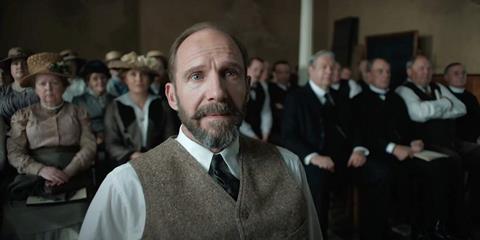Alan Bennett’s latest film follows a Yorkshire choral society struggling to survive during the first world war. The Choral attempts to show that music and art can heal a broken soul, says Giles Gough, but it’s attempt to address class, gender and religion leaves important themes underdeveloped

Set in the fictional Yorkshire town of Ramsden in 1916, The Choral is the story of a small amateur choral society trying to put on a performance. Sadly, as young men sign up to join the war effort, they keep losing members - including their choirmaster.
The only person who can replace him is Dr Guthrie (Ralph Fiennes) who is as prickly as he is talented. Also, in a time of extreme nationalism, Guthrie has spent time a lot of time in Germany and is very fond of German culture. Perhaps even more unfortunately, he’s an atheist, which doesn’t sit well with some of the more pious church members.
Bennett has plenty to say about class, gender and religion, but never gives any topic enough time to properly unpack the issues present
Both writer Alan Bennett and director Nicholas Hytner have storied careers bringing theatrical productions to life, including The History Boys and The Lady In the Van. One downside of transplanting stage to screen is that some retain an element of ‘stageyness’; largely being centred around people in a room, having a conversation. The Choral is not an adaptation of a stage play, but it certainly feels like it is.
But that’s enough bemoaning what the film is not. What it is, is another opportunity to appreciate Alan Bennett’s dialogue, which absolutely sings. There are numerous laugh-out-loud moments as the choral society’s committee try desperately to keep things going while haemorrhaging members.
Art and religion
When they finally recruit Fiennes’ Dr Guthrie, we get to enjoy his very specific type of pain. Namely, that of a leader with a true artistic vision having to work with amateurs with varying degrees of ability - some whose sense of entitlement vastly outstrips their talent.
Without any disrespect to the rest of the cast, the film definitely takes a step up when Fiennes appears on screen. His quiet but commanding performance captures the frustration of a sane man surrounded by jingoistic madness: “The vicars want it, the women want it, the idiots getting killed want it, who do you turn to?”
Yet in these troubled times, Guthrie is able to take the limitations he’s placed under and use it as an opportunity to create fantastic art, adapting Elgar’s ‘The dream of Gerontius’ to fit the cast he has available. It has some beautiful things to say about the healing power of art, and illustrates how a personal relationship with God has never been necessary for a person to create a phenomenal piece of art about God.
While that may well be the ultimate message the film is trying to convey, it is spread far too thin. Bennett seems to have plenty to say about class, gender and religion in The Choral but never seems to give any topic enough time to properly unpack the issues present.
Mixed messages
One scene, set in a military deferment hearing, touches on how the Church was complicit in the deaths of young men by encouraging them to sign up. Robert Emms plays Mr Horner, the accompanist crucial to the society’s upcoming performance, who wishes to register as a conscientious objector. He cites religious objections to killing, which are quickly dismissed by the pompous and condescending vicar, who tells Horner that he knows much more about God and his objections are baseless.
Another plot line follows one of the boys’ attempts to woo Mary, the star soprano who is also a devoted member of the Salvation Army. In his fumbling attempt to seduce her before he heads to the frontline, she rebuffs him by explaining that she believes if she doesn’t give in to his advances, God will keep him safe.
Both scenes could provide enough dramatic fodder for films in their own right, but they’re starved of screen time in a film that is beautiful but overstuffed.
The Choral would be the sort of thing you could watch with your grandma on a Sunday afternoon, if it wasn’t for the seamier elements of the film. Much of the story centres on teenage boys wanting to lose their virginity before they go off to war, and they tread on some women’s sexual boundaries as a result. Unfortunately, Bennett quickly loses interest in this plot thread and again moves on. It makes for unsettling viewing.
In the end, The Choral is not without its merits, but it’s by no means Bennett at his best.
The Choral is now showing in UK cinemas







































No comments yet